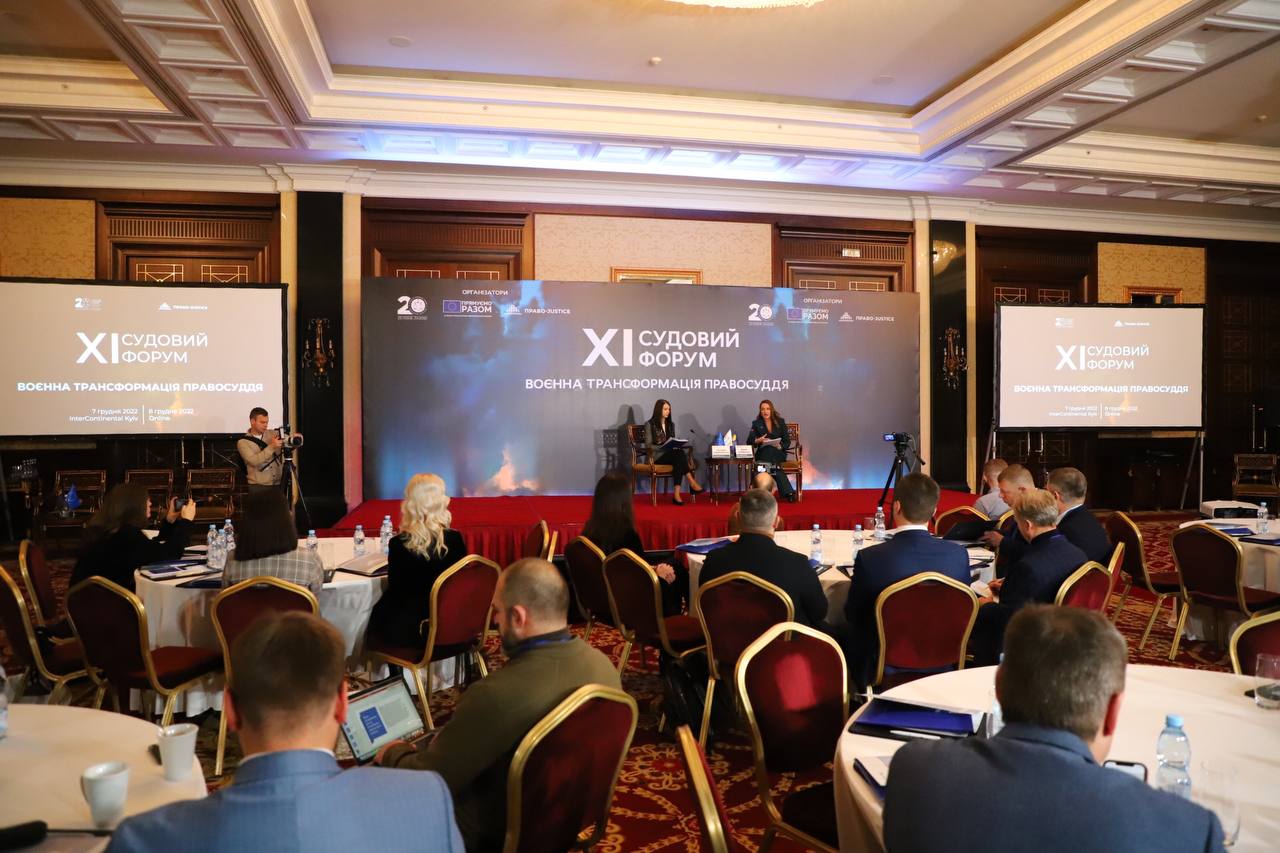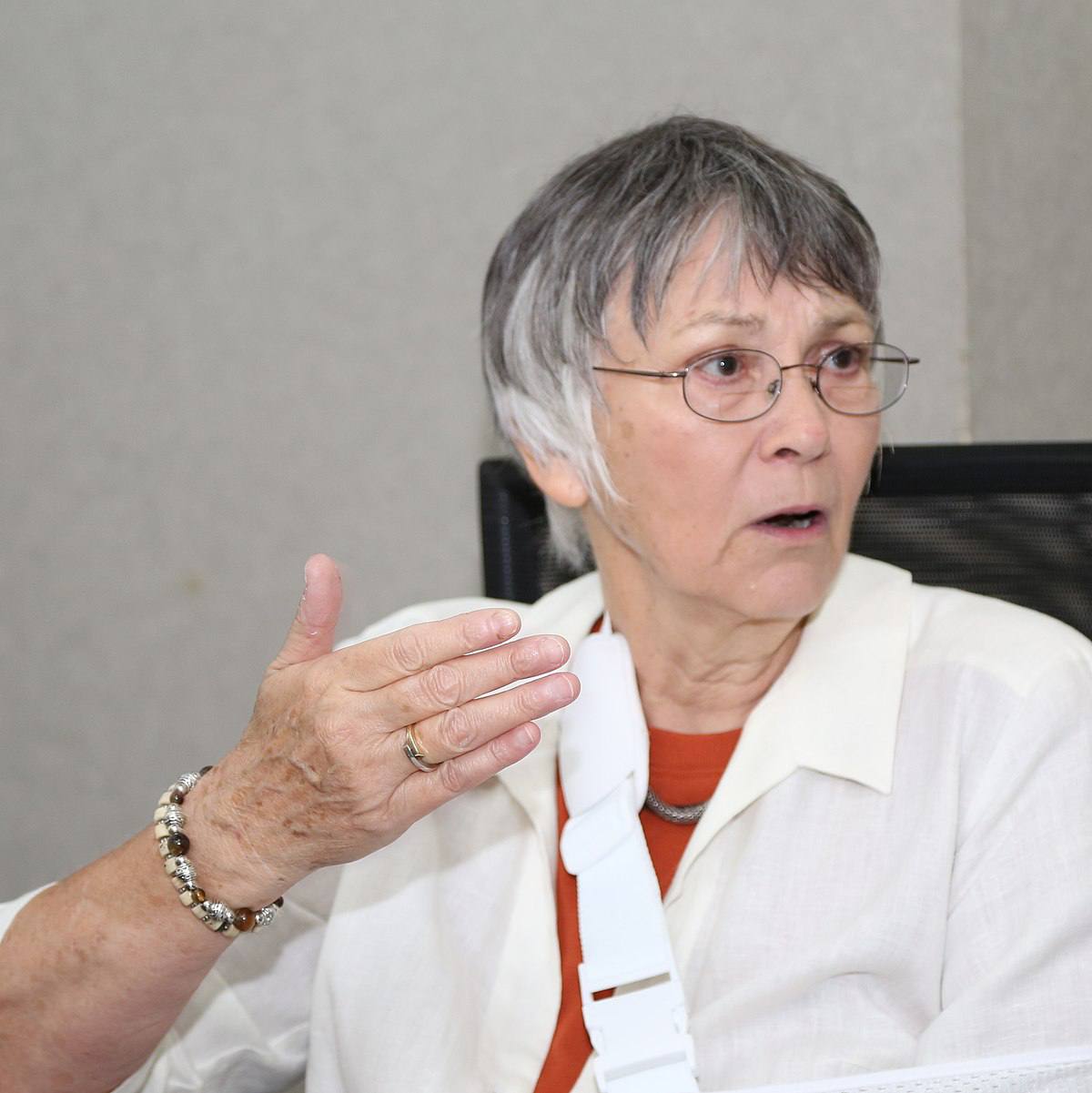Legal and Institutional Aspects of Responsibility for War Crimes Prevalent During the Second Day of ХІ Judicial Forum

Discussions on the second day of XI Annual Judicial Forum were focused on state and individual responsibility for crimes committed in Ukraine in the context of national and international justice systems.
In particular, Brenda J. Hollis, who is in charge of the Ukrainian workstream at the International Criminal Court (ICC), said that the Office of the Prosecutor at the ICC will continue to deepen cooperation with Ukraine in order to ensure that the top leadership of the Russian Federation is brought to justice.
“The illegal deportation of children from Ukraine to Russia is a flagrant violation of international law committed by the Russian leadership. This is one of the components of all those large-scale atrocities committed by the aggressor country. We see that all these actions do not make Ukraine less capable of confronting the enemy on the battlefield; they are directed at ordinary civilians. The same goes with large-scale attacks on the critical infrastructure of the state. Ordinary Ukrainians who stayed at home and need all the facilities and access to medical services suffer from their consequences,” said Brenda J. Hollis.

Also, the chief of the Ukrainian workstream at the International Criminal Court emphasized that sexual violence is also an essential component of all crimes committed by Russia, and this must be paid proper heed to by the international legal community.
In turn, Yurii Bielousov, Head of the Department on Combating Crimes Committed during Armed Conflict of the Prosecutor General’s Office, stated that Ukraine constantly interacts with international partners, in particular, provides them with evidence of crimes committed by the Russian Federation so that the persons waging war bear responsibility as soon as possible.
“For all the months the war has been going on, we are beginning to see the outlines of war crimes committed by Russia in Ukraine. I believe that the crime of genocide is getting more and more clear. Only as per official data, there are 8,500 dead civilians. Of them – 443 children. Another 11,500 people were injured because of the aggression. We continue to analyse what is happening. And, I hope, by the anniversary of the Russian full-scale invasion, we will present a practical strategy with concrete steps that will help bring the top leadership of the Russian Federation and all those involved in waging this war to justice,” said Yurii Bielousov.
He also added that Ukraine is gaining more and more experience regarding war crimes prosecutions, including national courts’ jurisprudence. Thus, there are already 627 suspects as of today. This covers top political and military leadership of the Russian Federation and representatives of other departments that contributed to or support the aggression. Also, 231 persons suspected of directly committing war crimes have already been identified. In particular, 67 cases have already been referred to court, and 16 judgments have been issued.
Pavlo Pushkar, Head of Division of the Department for the Enforcement of Judgments of the European Court of Human Rights of the Directorate-General for Human Rights and the Rule of Law of the Council of Europe covered the ability of the international and national legal systems to respond to serious and gross human rights violations. In particular, he provided information on losing some jurisdiction-related opportunities to restore violated rights, for example, as it is impossible to apply to the European Court of Human Rights with both individual and state applications.
“Given the escalation of aggression against Ukraine, on March 15, 2022, the Russian Federation was expelled from the Council of Europe. As of September 16, 2022, the Russian Federation ceased to participate in the system of the European Convention on Human Rights... Because of this, a jurisdictional problem arose: it is impossible to apply to the ECtHR in cases related facts that occurred after September 16, 2022,” Pavlo Pushkar said.
Pavlo Pushkar noted that the Council of Europe has quite clearly stated its intention to create an ad hoc Special Tribunal for the Crime of Aggression and a compensation mechanism (Reparations Commission) to deal with the consequences of the war in Ukraine.
“These two mechanisms can partially resolve some issues of the responsibility of the Russian Federation, in particular as to international law and human rights violations arising from an act of aggression and the fact that there is no jurisdiction as per the European Convention on Human Rights. The effect of the latter is narrowed to events within the jurisdiction of the court, i.e., until September 16, 2022,” Pavlo Pushkar said.
The speaker believes that these bodies are necessary, but national legal and judicial system as well as law enforcement system must also adequately respond to challenges in order to ensure international legal responsibility of the Russian Federation and to prevent the aggressor’s impunity.
Another intervention during the discussion was made by Markiian Bem, national expert of the Council of Europe. He noted that the capacity of national pretrial investigation bodies as to documenting crimes committed by the Russian Federation are not fully utilized in Ukraine. In particular, Bem advises to pay attention to the recommendations of the International Committee of the Red Cross as to investigating war crimes during hostilities on the demarcation line.
“So many war crimes are committed directly on the demarcation line during hostilities. And this is the toughest area because it is extremely difficult to document such crimes,” said Bem.
Among the challenges, as Bem pointed out, there are difficulties in getting access to the place where events took place (security aspect), recording witnesses’ statements and, in fact, recording the facts that crimes have been committed. Therefore, according to the recommendations of the Red Cross, the main burden of documenting such crimes is to fall on the shoulders of the military, since they, by virtue of their duties, are the first to arrive at the scene of events in hot spots. Under certain circumstances, they can perform primary and important actions: take photos and videos, inspect the scene, identify witnesses and draw up a protocol. Also, they should report on the facts discovered and signs of war crimes they established through their communication channels.
According to Markiian Bem, it is necessary to change the approaches as to training and upskilling the military for them to be able to perform similar functions; it is also necessary to amend the national legislation.
In turn, Eric Svanidze, Key International Expert of EU Project Pravo-Justice who moderated this discussion emphasized that Ukraine is able to effectively investigate war crimes committed by the Russian Federation on its territory. The EU Pravo-Justice Project will provide comprehensive support in this regard to Ukrainian law enforcement agencies, in particular, the OPG, and judiciary bodies and institutions.
Olha Buleiko, justice of the Criminal Cassation Court within the Supreme Court, spoke about guaranteeing fair trial for the military.
“Sentencing a person found guilty of a crime is the main task entrusted to court. It is also a great responsibility which involves performing legal action on behalf of the state. Understanding the challenges justices of the Supreme Court will face after February 2022, they are engaged in solving these issues,” Olha Buleiko said.
According to her, the Supreme Court thought about the qualification of war crimes, determining the persons and institutions in charge of evaluating evidence given that since February 2022, the criminal substantive and procedural legislation have seen numerous amendments, etc.
Olha Buleiko also noted that the Supreme Court has repeatedly expressed its support for the initiative of Volodymyr Zelenskyi, President of Ukraine to set up a Special International Tribunal on Aggression against Ukraine.
“In this regard, invaluable is the help provided by international institutions, in particular, the International Criminal Court; Ukraine started cooperating with the ICC in 2014,” emphasized the justice of the Criminal Cassation Court within the Supreme Court.
Moreover, Serhii Movchan, Head of the Department on Documenting War Crimes of the Ukrainian Helsinki Human Rights Union also took the floor in this part of XI Annual Judicial Forum. He spoke on how civil society and national and international institutions interact as to documenting war crimes. Larysa Denysenko, Ukrainian writer and human rights defender, also spoke in this part of the forum. Her presentation was dedicated to finding balance between the demand of the society to have speedy justice and an impartial investigation and trial.
It should be noted that XI Annual Judicial Forum dedicated to the topic of military transformation of justice was arranged by the Ukrainian Bar Association together with EU Project Pravo-Justice. The event was aimed at discussing topical issues related to judiciary operations during martial law in Ukraine with representatives of judiciary institutions, international and national experts.